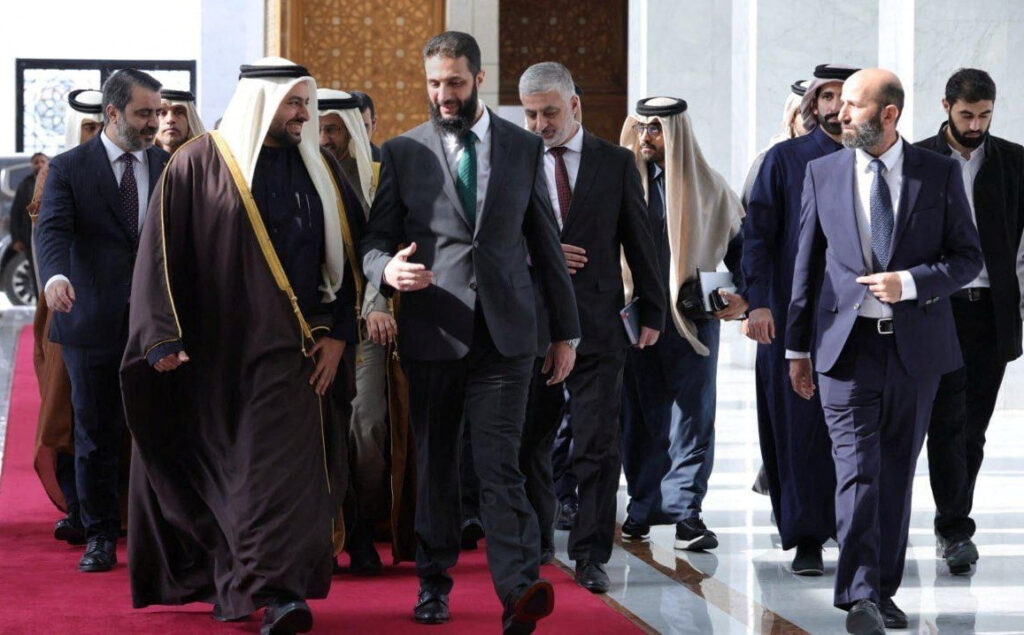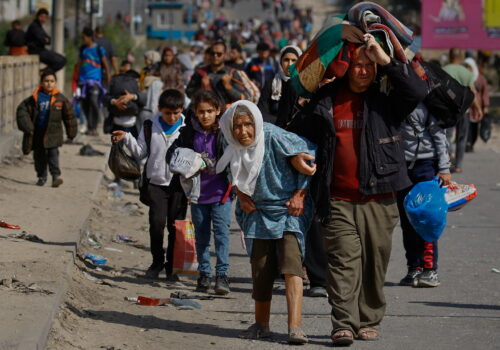For the past six years, Gulf countries had been starting to normalize relations with the Bashar al-Assad regime in Syria, with several even reopening their embassies in Damascus, which had been shuttered after the civil war broke out in 2011. This was driven by the perceived strategic costs of keeping Assad isolated even as he seemed entrenched in power, and while Iran’s influence in the region continued to grow.
Gulf countries publicly cited regional tensions and the growing role of non-Arab states in Syria as reasons for normalization. Saudi Arabia was the latest to reopen its embassy in Damascus in September 2024, following similar moves by the United Arab Emirates (UAE) and Bahrain in December 2018, ostensibly to “reduce Iranian influence,” according to Robert Ford, a former US ambassador to Syria. (By contrast, Qatar maintained a staunchly critical stance toward the Assad regime, refusing to normalize ties.)
Assad was welcomed back into the Arab League last year, attending a summit in Saudi Arabia. And the UAE even reportedly joined the United States in negotiations aimed at securing US sanctions relief in return for Assad curbing Iran’s arms smuggling through Syria.
With Assad having fled to Moscow after the stunning and rapid fall of his regime this month, Gulf states that had supported Assad are now left empty-handed. But the turn of events offers these countries, which rarely act as a bloc, an immense opportunity to join forces and wield significant influence—both political and financial—over Syria’s future while adapting to Turkey’s rising prominence in the country.
The Gulf’s friendly overtures
Shortly after Assad’s December 8 fall, Saudi Arabia, the UAE, Bahrain, and Oman resumed their diplomatic activities in Damascus, and they were in turn thanked by the new Syrian government’s Department of Political Affairs in a December 12 statement. This statement followed meetings the new leadership held with the ambassadors from these countries, as well as Qatar. Also on December 12, Bahrain—which headed the Arab League this year—expressed its support for the transition via a letter to the new leadership in Syria. On December 14, the Arab Ministerial Contact Committee on Syria (which includes Arab, Western, and Turkish diplomats) highlighted Arab support for Syria’s political transition under the interim authorities.
Meanwhile, Saudi Arabia expressed the “strongest support” for Syria’s people after the fall of Assad’s government, commending measures taken by the new leadership in Damascus to protect Syria’s minorities and promote stability. A Saudi delegation headed by an advisor from the Saudi Royal Court met with Syria’s new leader on December 22, amid reports that Saudi Arabia will start supplying oil to Damascus. A good indicator that Saudi Arabia is serious about cooperating with Syria’s transition is that the kingdom is already cooperating at the highest level with the most influential outside player in Syria—one that is rapidly ascendant in the region—Turkey.
The UAE, which started the normalization process with Assad in the Gulf, was the last Gulf country to publicly signal positive engagement with Syria’s new administration, marked by a phone call between the respective foreign ministers on December 23. It remains to be seen whether Abu Dhabi will cautiously move to fully and publicly support the new administration in Damascus by sending humanitarian or financial aid to the country in the upcoming weeks, as neighboring Qatar has already done. On December 14, Anwar Gargash, diplomatic advisor to the UAE’s president, expressed optimism about the new leadership’s language on unity. Gargash also strongly emphasized the need to remain on guard given the new leadership’s ties to Islamist factions. He also wrote in an X post that the Arab Ministerial Contact Committee on Syria’s meeting “reflected a positive Arab approach to support our brothers in the path of political and peaceful transition” in Syria.
These moves across the Gulf add up to a positive signal that the countries that normalized with Assad are likely to deal pragmatically with the realities of the new Syria.
Turkey’s rising influence
As the country with the strongest relationship with Syria’s new leadership, Turkey is likely to hold ample leverage over Syria’s future—and even the region, given its increasingly assertive role across the Middle East and North Africa. Turkey’s gains in Syria bolster its standing vis-à-vis Iran in other areas such as the South Caucasus, where Turkey maintains close cooperation with Azerbaijan while Iran has close ties with Armenia. However, Ankara should not shoulder the role of reconstruction and state-building in Syria alone. Collaborating with the Arab states of the Gulf could bring both legitimacy and essential financial resources to Syria’s reconstruction efforts.
Among the Gulf states, Qatar is likely to wield the most influence over the new leadership in Damascus, having played a central role in facilitating talks between foreign ministers from Arab states, Turkey, Russia, and Iran during the Doha Forum that ultimately determined Assad’s fate. In meetings in Doha with Atlantic Council experts (myself included) just hours after the fall of Assad had been announced on December 8, senior Qatari national security figures expressed an air of vindication for their refusal to normalize with the Assad regime. Notably, Qatar was the only country in the Gulf already hosting the Syrian National Coalition, which it recognized as Syria’s sole legitimate representative.
The Trump administration’s opportunity
The fall of Assad represents a massive setback for Iran, and Gulf states must seize this moment as an unparalleled opportunity to reinforce the Arab role in Syria’s future. By pressuring and guiding the new leadership in Syria to form an inclusive government, Gulf countries can safeguard their interests while minimizing the risks of renewed instability that threaten the entire region.
The Trump administration also has a key role to play. As the new Syrian government faces the daunting and costly task of reconstruction, regional and international support will be indispensable to ensure that Syria does not fail again and destabilize the region. President-elect Donald Trump should lead the way alongside Turkey and the Arab Gulf states in pooling the funds required for Syria’s reconstruction and transitional governance, which would also strike a decisive strategic blow to Iran’s presence in Syria. Such assistance should be tied to clear conditions that would guarantee stability and an inclusive political process to build something better than what Syrians endured under Assad.
The fall of the Assad regime will have profound consequences for the region in the years ahead. And the United States and Gulf states have new leverage—both financial and diplomatic—to shape what those consequences will be. Any new administration in Damascus is likely eager to get Washington’s approval at the earliest possible moment to solidify its international legitimacy. That gives the United States and its Gulf allies the chance to positively impact the new political process in the country—and to secure any necessary changes from Syria’s new leadership—if it strays off course.
Joze Pelayo is an associate director at the Atlantic Council’s Scowcroft Middle East Security Initiative.
Further reading
Sat, Dec 21, 2024
A US blueprint for Syria’s fragile transition
MENASource By
As long as HTS is willing to evolve and accept constructive criticism, the US should engage with the group. Ignoring Syria’s new leaders will not make them go away.
Fri, Dec 20, 2024
What will minority and women’s rights look like in the new Syria?
MENASource By Sinan Hatahet
After years of conflict and division, there is an opportunity to build a more inclusive and just future that reflects the resilience, diversity, and aspirations of all Syrians.
Thu, Dec 19, 2024
2024: A year in the Middle East
MENASource By
2024 was a year of consequence for the Middle East and North Africa, with metastasizing conflict, human tragedies, and major elections across the region.
Image: Qatar's Minister of State Mohammed bin Abdulaziz Al-Khulaifi meets with Syria's de facto leader Ahmed al-Sharaa, also known as Abu Mohammed al-Golani, after the ousting of Syria's Bashar al-Assad, in Damascus, Syria, December 23, 2024. Qatar News Agency/Handout via Reuters.



